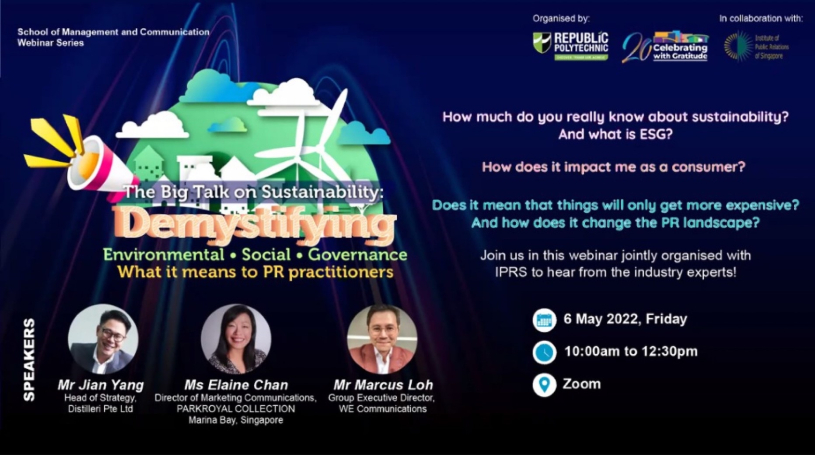The Big Sustainability Talk - RP And IPRS Joint Conference 2021
PR professionals play a critical role in delivering sustainability messages in an authentic and compelling way. Speakers in this joint-conference shared their first hand experience in managing ESG mandates. Big thanks to Republic Polytechnic for organising this event. And special thanks to leading industry practitioners - Elaine Chan, Jian Yang and Marcus Loh.
Greg Danker, our RP-IPRS Student Chapter Advisor shares his takeaways from the Speakers.
When asked about whether ESG would ever be democratised to allow consumers to make demands on companies to become sustainable and comply with ESG reporting standards, Marcus Loh mentioned that it is already democratised, as people are better informed about sustainability and ESG, many companies have started to align their business practices that way and have set aside funds specifically to further enhance their operations that way. He also shared, that he believes that brands that do not move ahead of the curve (to adopt sustainability and ESG practices) will be on the wrong side of history.
Jian Yang shared that toy manufacturers like MGA Enterprise and Mattel are already taking steps to improve their manufacturing and packaging of their toys to be more sustainable and have started looking at sustainability and ESG in their business operations. Where they can, they have cut back on excessive plastic packaging and in some instances and transformed the production of toys and packaging to use paper or other environmentally friendly materials. It is small steps for now, but nonetheless, a step in the right direction.
I was blown away by how committed the PARKROYAL COLLECTION Marina Bay, Singapore is to sustainability and ESG practices. For one, they opted to retrofit the current building where the hotel stands instead of demolishing it and rebuilding which would have been equivalent to several hundred tonnes of carbon generated in the process - which would have required the planting several tens of thousands of trees to off-set that carbon footprint. They have also repurposed the hotel’s atrium and the interior of the hotel to have a garden within the hotel which not only makes it unique but would also ensure the air in the hotel is naturally filtered and fresh.
In addition, they have installed solar panels on their roof-tops to off-set the energy needed to run all their elevators, emergency lighting and other electrical needs. They also have their own herbs and edible gardens which accounts for up to 20% of their monthly needs for fresh vegetable produce for all their restaurants. Though these measures may not account for a large reduction of their carbon footprint at the moment, it is definitely a step in the right direction.
These are just some of my take-aways from the webinar on Friday.
It is has opened our eyes to how companies need to transform themselves to remain relevant in the future, or as Marcus mentioned, those who don’t would find themselves on the wrong side of history and become irrelevant and eventually cease to exist due to the fast changing demands from their various stakeholders.


